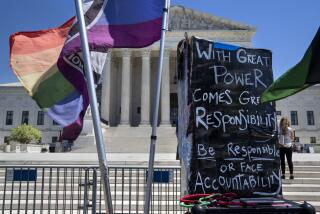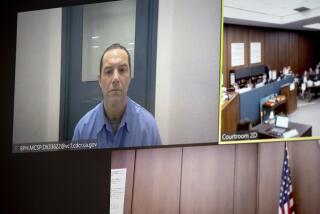Supreme Court to hear fight over taking DNA from arrested people
WASHINGTON — On a cold February night three years ago, police in suburban Arlington, Va., received a frantic call. A young woman said her roommate had been abducted at gunpoint by a short, clean-shaven man who sped away in a silver SUV.
At dawn, a motorist spotted the victim in a snowy field near a highway, raped and strangled, but alive. An alert officer, hearing the lookout report, recalled that he’d jotted down the license tag of a silver Dodge Durango whose driver lurked near bars at midnight, leading to the quick arrest of a short, clean-shaven Marine named Jorge Torrez.
Ten years ago, Virginia became the first state to require, upon arrest for a serious crime, a mouth swab for DNA. The sample from Torrez, sent to a state crime lab and entered into the FBI’s DNA database, confirmed he was the rapist. A few weeks later a DNA match also led to charges against him in the rape and murder of two girls, ages 8 and 9, in Zion, Ill., where Torrez had gone to high school. Jerry Hobbs, the father of one of the girls, had been in prison for the crimes.
This month, the U.S. Supreme Court will take up a privacy rights challenge to taking DNA from people who are arrested. The case could either end the practice or make it the norm nationwide.
Arlington County Deputy Police Chief Daniel Murray says the Torrez case shows the value of taking DNA when someone is arrested for a serious crime. “It’s extremely important to quickly identify someone who would be a danger to society if he were on the loose,” he said. And in this instance, he said, the DNA match freed an innocent man.
Nationwide, DNA samples are taken from people who are convicted of violent crimes.
Going further, the federal government and 28 states, including California, Illinois and Florida, now take DNA samples from some or all who are arrested but not yet convicted of serious crimes. Besides taking fingerprints, the standard jail booking now often includes taking a DNA swab, which prosecutors say is as simple and painless as brushing your teeth.
Last month, President Obama signed into law the Katie Sepich Enhanced DNA Collection Act, which will help pay the start-up costs for other states to begin testing people who are arrested.
“The whole purpose of this is to find serial rapists and murderers and to get them early to save innocent lives,” said Jayann Sepich, a New Mexico mother whose daughter Katie was raped and murdered. Her attacker was arrested several times, but he was not identified until he was convicted of another crime and his DNA was taken.
California prosecutors say arrests for nonviolent crimes, including drug offenses, credit card fraud and burglary, have led them to rapists and murderers, thanks to DNA tests.
But the constitutionality of taking DNA upon arrest remains in doubt, particularly when it is not needed to identify the suspect. For example, police do not need DNA to identify someone who is caught with drugs or breaking into a house.
A state appeals court in San Francisco and a federal judge in Sacramento ruled it was unconstitutional to require a DNA sample from someone who had been arrested but not convicted. The California Supreme Court and the U.S. 9th Circuit Court of Appeals have put the issue on hold pending a ruling from U.S. Supreme Court.
The justices will hear the case of Maryland vs. King to decide whether requiring DNA from someone taken into custody but not convicted is an “unreasonable search” forbidden by the 4th Amendment.
In 2009, Alonzo King from Salisbury, Md., was arrested for waving a shotgun in a threatening manner. That was a felony charge, calling for a DNA test. He later pleaded guilty to a lesser charge for which no DNA test was required. But the DNA sample taken upon arrest pointed to him as the man who had broken into a house and raped a woman six years earlier. King was convicted and given a life term.
But Maryland’s high court threw out his conviction and ruled police may not take DNA without a search warrant and some reason to believe the suspect had committed another offense. “DNA samples contain a massive amount of deeply personal information,” far more than a fingerprint, the state judges said.
Civil liberties advocates have urged the court to hold the line and to bar DNA searches until someone has been convicted.
“This could be an unprecedented expansion of search power. The rule has been the government has to have a specific suspicion before they search,” said Erin Murphy, a DNA law expert at New York University. “If you are arrested for a drug crime, that doesn’t mean the police can walk into your house looking for evidence of other crimes.”
But victims rights groups, the Obama administration and the top state attorneys from California and 48 other states have urged the court to rule that routine DNA testing upon arrest is reasonable and constitutional. They say the mouth swab is a minor invasion of privacy at most and that it has an extraordinary potential for solving heinous crimes.
More to Read
Start your day right
Sign up for Essential California for news, features and recommendations from the L.A. Times and beyond in your inbox six days a week.
You may occasionally receive promotional content from the Los Angeles Times.







